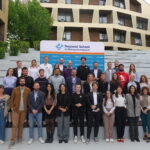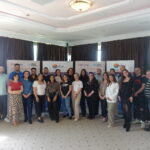The fourth round of Belgrade Dialogues under the title “Europe between Nationalism, Populism and Enlargement” took place last week – at the Belgrade City Hall on December 8th and the Cultural Association LOLA on December 9th. The event was organized by the Belgrade Fund for Political Excellence in cooperation with Forum Serbia Germany, and in partnership with the Wilfried Martens Centre for European Studies. The event was generously supported by the Balkan Trust for Democracy and the Council of Europe, and the strategic media partner of the conference was Tanjug News Agency.
Summary of sessions
The conference host, Program Coordinator at the Belgrade Fund for Political Excellence Mr. Bogdan Urošević, greeted the guests and reminded of the beginnings of the Belgrade Dialogues initiative in February 2015. Having described previous engagements and topics, he underlined that the Belgrade Dialogues do not shun from asking difficult questions and strive to gather representatives of different and opposing ideals, stands and political views.
The opening speeches started with Mr. Bojan Predojević, Chairman of the Board at Forum Serbia Germany and Managing Director of Profine Group. Mr. Predojević recounted the beginnings of the EU’s particular interest for the Western Balkans in the 1990s after the breakup of the Yugoslav Federation. He went on to link the relationship between Germany and France after the Second World War to Serbia and Albania nowadays. Using W. Churchill’s notion that “the Balkans create too much history”, he illustrated the problem with cooperation and mutual trust among the Balkan countries and stated that the stagnation of the EU enlargement process would harm the development of Serbia and its surrounding countries and would ultimately pose a security concern. He reminded that the elections in Germany and France are yet to come and that the “tripod of the European stability” was already damaged due to the Brexit vote. At the same time, Predojević underlined that the Western Balkans greatly rely on Germany in the reconciliation process, and posed a question whether the exit-vote tendency in the EU is a beginning of the “Yugoslavisation of the European Union”.
Ms. Jadranka Joksimović, Serbian Minister of EU Integrations stated that the term “Western Balkans” in her opinion is a purely political space that is only there to gather non EU countries. She further explained that Albania and Serbia are not in the same situation as France and Germany used to be, although she pointed out that the economy and pragmatic solutions should be Serbia’s primary focus. The Minister acknowledged the fact that most Serbian citizens would like to live, work or study in one of the EU Member States, which meant to her that they deeply understood the significance and the positive sides of EU Membership. And even though the entire process is taking a lot of time and effort, Ms. Joksimović explained that the EU integration process is not just about the amount of opened chapters and setting of dates, but that it is a great mechanism for Serbia’s development and reform in its own right. “History is not just a learning process, it is also a process of abandoning of what was wrong in the past”, concluded Minister Joksimović.
H.E. Axel Dittmann, Ambassador of the Federal Republic of Germany in Serbia entertained the thought that the world has entered the post-truth era and recognized the media independence and accountability as a major issue in the future development. Mr. Dittmann praised Serbia for showing its good, philanthropic side during the migrant crisis, whereby he clearly stated that Germany is in favour of opening three new chapters for Serbia’s EU integration process. He further analysed EU’s current situation and concluded that, although not all the problems were resolved, the EU still manages to offer firm solutions and take practical actions. His Excellency reminded that all of the recent challenges were transnational and that unity is the key, since no country would be able to handle the crisis on its own.
Deputy EU Ambassador in Serbia, Mr. Oskar Benedikt showed content with the pro-EU orientation of the Serbian political representatives, although he pointed out that the opening of new chapters is mainly a symbol of progress that should be followed by taking action and tackling challenges directly. While acknowledging the existence of pessimism and fear of EU-breakup, he invited the representatives and intellectuals to help maintain optimism and cooperation. Mr. Benedikt went on to describe populism as the voice of people against corrupted elites, the people that aim to defend their identity, but that are taken over by fear and anger. Fear is, according to Benedikt, our greatest enemy that could lead us to make the easier, but probably not the right choice. “Are we sure that we want the Europe before the EU, the Europe that was divided and unstable?” – stated Mr. Benedikt, while naming two greatest needs of the EU: transnational cooperation and political stability in the Member States.
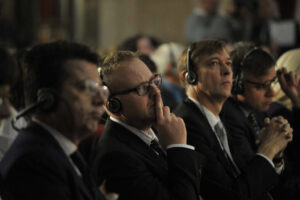
Photo A. Andjic/BFPE/FSN
Professor Adam Fagan, Head of School of Politics and International Relations at the Queen Mary University of London and Professorial Fellow at London School of Economics provided a keynote address for the plenary part of the conference. Mr. Fagan found that both the left- and the right-wing populism are characterized by a lack of a democratic voice. He urged the intellectuals and decision-makers to dedicate themselves to the challenges, to put the current crisis into a historical context and remind of the reasons for the very creation of the EU. By naming specified examples of development and growth in both Member and Candidate States, he illustrated the power of the EU membership to transform institutions and create resilience to crises and threats. He further explained that the EU framework never posed a firewall against populism and nationalism, or a prevention against political movements, but that it served as a normative mechanism for creating policy and assuring efficiency and transparency. While admitting that the Western Balkans context is different than previous enlargement initiatives in the Central-Eastern Europe, Fagan explicitly stated that it is wrong to reject the entire idea of unity, progress and cooperation because of the current crisis. “The new institutions work; the new legal and economic frameworks of the EU work”, declared Mr. Fagan, while underlining that every positive reform can in some situations be reversed. When analysing the situation in the civil sector, Fagan didn’t cower away from bringing up the role of the NGO sector in Serbia, which, according to him, from time to time looked more like an iteration of governance than a true manifestation of civil society. He pointed out the possible loss of development momentum, or “backsliding” of Serbia as one of the major threats, should the EU enlargement process be postponed. Mr. Fagan concluded his speech by posing the question: “If not the EU, then what?”
Two ensuing panel discussions consisted of renowned politicians, researchers and experts in the areas of European studies, international cooperation and development, who discussed the rise of nationalism and populism within the EU states, the crisis of the European idea and the possibilities for further EU enlargement.
(I) Panel discussion: The Rise of Nationalism and Populism in the European Union: the Impact on the European idea
Panellists: Antonis Klapsis, Adjunct Lecturer, Hellenic Open University & Neapolis University Pafos; Alumni Visiting Fellow, Wilfried Martens Centre for European Studies. Čedomir Antić,President of the Progressive Club. Gert Weisskirchen, former member of the German Bundestag. Moderator: Jelena Volić-Hellbusch, CIM Expert at the Belgrade Fund for Political Excellence; Secretary General of Forum Serbia Germany.
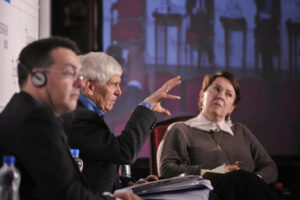
Photo A. Andjic/BFPE/FSN
The first panel was opened by Ms. Volić-Hellbusch, who invited the participants not to regard nationalism, populism and their origins as taboo-subjects, but to openly discuss them; she also advised not to perceive the EU enlargement as a given, but as a gift. She introduced Mr. Weisskirchen as a friend of former Yugoslav countries and one of the founding proponents of the EU. Weisskirchen explained that the Southeast Europe was seen as a region closer to Yugoslavia than to the EU in the 1970s and 1980s; in the 1980s the Serbian Academy of Sciences and Arts (SANU) published the manifesto of a new nationalism that was, according to Weisskirchen, “hijacked” by the Milosevic regime. The panellist declared to have voiced the proposal for the EU to admit the entire structure Yugoslavia and that he was faced with great scepticism. But according to him, this leap of faith would not have imported nationalism, but would have prevented later conflicts. Mr. Weisskirchen stated that the largest role the EU has played was in preventing violence in Europe. As for the recent development in Britain and the USA, Weisskirchen saw a common trait between Brexit and Trump in that the populists in both situations try to benefit from the crisis; he concluded that, even though populism and fascism are not the same and simultaneous movements, populism could potentially serve as a catalyst for more extreme views and measures.
After the first statement, Ms. Volić-Hellbusch underlined that living in a German society meant confronting history at all times and that German democracy relied on this precaution, as well as that the Greek economic crisis is perceived as the event that set in motion the whole current situation in the EU. Mr. Antonis Klapsis entertained the idea, noting however that euro-scepticism is not a completely new wave that argues that the EU is not a solution, but the very reason for the crisis. He used the words of the conservative French politician Marine Le Pen, who stated that the EU meant economic war, to illustrate how populists could try to link the migrant crisis to the everlasting social problems – unemployment, crime etc. Through this illustration, he concluded that the populists in the EU claim to be protecting the “Christian tradition” and see the current migration as a safety threat. According to Mr. Klapsis, the nationalists have lost their national sovereignty paradise and now they base their key decisions on the resulting emotions, not on reason or facts. Klapsis also noted that a lot of people do not think they need the EU regulations and believe they know better than the elites, so they seek new leaders who would acknowledge that. The populists then, according to Klapsis, play with the fear of the average person in this ever-changing world and push them to fight anything they perceive as “the system”. He concluded that the Brexit referendum was a vote against globalization, but that crises can only be addressed through cooperation, which is not happening at the moment.
Ms. Volić-Hellbusch added that we are facing a digital and technological revolution that the world is not ready to deal with, which causes the internal crisis. She raised the question of the capability of the EU to resolve the so far unresolved issues of its Member States, to which Mr. Čedomir Antićreminded that Europe has not shown a desire to reform since 1992 and that there has to be some form of accountability of Brussels and the closed-off elites. According to Mr. Antić, Brussels believes that the rest of the world should emulate their modernization, but it needs a more flexible approach, considering the fact that some EU countries had had the time and the resources to resolve their internal issues and now it is expected for other countries to do the same for a shorter amount of time and with less resources and opportunities. He advised not to deny Brexit and not to blame others for their choices, but to once again link the elites to the common people, which would be a more just and ultimately more effective approach.
During the discussion, Mr. Wolfram Maas, former Ambassador of the Federal Republic of Germany added to the conversation that the people today are not enough engaged in politics and that they distrust the politicians, to which Mr. Weisskirchenreplied that the cosmopolitan reality and the national perspective are clashing, which could be overcome by a new, fresh face of the EU. Mr. Hans Estermann from the National Alliance for Local Economic Development saw the lack of desire to vote as one of the key issues, as well as the inert political elites that do not maintain a dialogue with their citizens. Mr. Antić, on the other hand, recognized the lack of solidarity as the greatest weakness. He concluded that Serbia will have to re-evaluate its cultural patterns and mind-set in order to continue its development. Looking at the issue from the angle of Greece, Mr. Klapsis found that the implementation of changes takes more time than people are often ready to give and that a lot is being taken for granted; politicians today must, in his view, be able to think both globally and locally. Mr. Weisskirchen closed the first panel discussion with the idea that the economic democratization should be delivered in a different form and that the potential losers of the globalization should be taken into consideration when making decisions.
(II) Panel discussion: Enlargement as a Possible Answer to the EU State Members’ and State Candidates’ Crisis
Panellists: Margarida Marques, Secretary of State of European Affairs, Republic of Portugal. Vesna Pusić, former Minister for Foreign and European Affairs of Croatia, Honorary President of the Croatia’s People’s Party. Konrad Niklewicz, Deputy Director, Civic Institute – Civil Think-Tank Platform; Visiting Fellow, Wilfried Martens Centre for European Studies. Peter Friedrich, former State Minister of Federal, European and international Affairs, BadenWürttemberg. Miša Đurković,Director, Institute for European Studies. Moderator: Sonja Licht, President of the Belgrade Fund for Political Excellence.
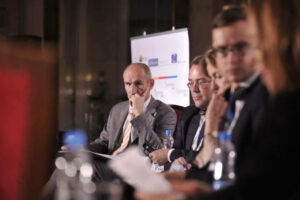
Photo A. Andjic/BFPE/FSN
President of the Belgrade Fund for Political Excellence Ms. Sonja Licht opened the second panel discussion by reminding of the former conclusion that the public would like to be more involved in the decision-making process. Ms. Margarida Marques replied that it is not always easy to leave the Brussels bubble, but that it is vital today, when the first association to the EU is the crisis it is currently going through. She recounted the accession of Portugal and Spain into the EU after long-lasting dictatorships and underlined the significance of the EU framework as a means of development and improvement. According to Ms. Marques, the Portuguese citizens recognized the EU through the funds given as a form of support, but noted as well that the main reasons for Portugal to turn itself toward EU were not economy and financial aid, but politics and mobility, which would play a great part in its social transformation. She also stated that enlargement should always come with strict conditions, for three main reasons: EU’s credibility, reform benefits for both the candidate and the Member States, as well as the fear of certain Member States who oppose the enlargement as a whole. However, Ms. Marques noted that she deeply believes that joining the EU is a task that is worth the effort.
Ms. Licht acknowledged that what Serbia is going through today is much more demanding than Croatia’s accession. Ms. Vesna Pusić replied that most Balkan countries have a short history of statehood and a shorter history of democracy. In her opinion, the EU has changed significantly since Croatia’s accession, but that the road toward the EU in the Balkans should be an insurance against our own actions; in her words, the EU could be a safeguard against denial, nationalism and extremism, since many societies with a turbulent history tend to be exclusive and not tolerant enough. For the Western Balkan countries, she stated, the EU could become a benchmark that indicates the path we want to take. She saw the rebellion against the elites as the rebellion of common people fuelled by the “poor students” from the bottom of the class – she noticed that Obama is perceived as part of the elite, while Trump was considered an “underdog”, even though he comes from a wealthy class. Obama, according to Ms. Pusić, would represent the elite of ideas and thoughts, not of power. However, she considers wrong the idea that the most privileged members of the society could be the front row fighters against the elites. Ms. Pusić admitted that the intellectual elites have forgotten about the broader segments of society that have been degrading over time, especially when it comes to education. She concluded that the populists have recognized the anger and disappointment of the excluded groups, but that they don’t honestly care, rather they imitate passion in order to gain power.
Mr. Konrad Niklewicz then added that the populists tend to act as if there are simple answers to complicated questions. Observing from the Poland’s point of view, he noticed that people wanted quick changes in living standards and compared themselves to more developed countries, not to themselves a couple of decades ago, which lead to an accusation of Poland breaching the EU Rule of Law. As for the fear and scepticism towards enlargement within the Member States, he reminded that Wester Europe still remembers the case of Romania and Bulgaria, and that they hesitate to welcome the next enlargement fearing that the new candidates are not yet ready. Niklewicz advised candidate states not to give a pretext to anyone who would want to postpone or stop the EU enlargement process, but to take clear actions to show that they are willing and prepared.
Following Mr. Niklewicz’s advice, Mr. Miloš Đurković explained that the people who voted for Hofer in Austria cannot be considered fascists, but that they are fighting against imposed authorities. He noticed that the political elites in the UK have used the referendum to establish their own power, but that it backfired with consequences which are yet to become obvious. Đurković also illustrated how important national identity is for every person in Europe with the words: “An Italian does not call himself European until he moves to America”. As for the candidate states, he acknowledges that they are still not in a good enough shape, but that they now need to have clear priorities and definite political goals in order to move on.
The definite support of Germany for the EU integration of the Western Balkans was once again underlined by Mr. Peter Freidrich, who also reminded that the Lisbon treaty did not allow the EU to take actions or demand strict conditions after the candidate state has already become a member state. He then declared the return of geopolitics into the enlargement politics and stated that global changes and technology also cause the social and political transformation within the EU, but that there is a fragmented political consciousness throughout the world. As for the EU integration of the Western Balkans, he warned that Croatia’s accession did not automatically bring on economic growth and that Serbia must be ready for a social transformation. However, he also noticed that there is a political will and room for progress and maturing of democracy. He concluded his statement by adding that the states cannot build walls against globalization and that the EU must engage in the politics of justified hope.
During the open discussion, Mr. Marko Čomić delcared the need for more “megaphone diplomacy”, while stating that education is not purely a solution, but a pre-requisite for positive development. He saw the growth of civic self-respect as a necessity in order for people to be able to request accountability in politics and economy. Mr. Vladimir Vuletić recounted the political development in Europe from the 1980s when the social-democratic discourse shifted towards a neo-liberal one, whereas today it is shifting from neo-liberal to a neo-national discourse. He recognized this tendency as a consequence of the crisis of legitimacy. Ms. Volić-Hellbuschon the other hand saw a tendency of Member States to perceive the candidate states as different and unfamiliar, which could ultimately breed inequality, injustice and then anger. In her opinion, the attitude of the Member States should be more open and welcoming, in order to prevent the extinguishing of pro-EU movements in the candidate states. Mr. Friedrichrounded up the discussion by stating that people perceive themselves as members of a nation, not of a continent and that the current crisis is, before all, a clash of two lifestyles and two perspectives.
Closing remarks were provided by Ms. Sonja Licht. She once again underlined that the both the left-wing and right-wing centre parties are going through an identity crisis, which could facilitate new conflict, but that an open debate is one of the most successful ways to ensure the best possible outcome of this development. She closed the conference with the statement that the dialogue is the basic mechanism of democracy.
After the panel discussions, two expert roundtables took place – one at the Belgrade City Hall on December 8th dealing with the influence of the European crisis on the economy of the European Union and the candidate countries, while the second roundtable at the Cultural Association LOLA on December 9th focused on the concept and vision that Europe can offer for the future.
The conclusions and outcomes of the roundtables will be compiled into a final publication and shortly published.
Report compiled by Jovana Dimitrijevic, Forum Serbia Germany








